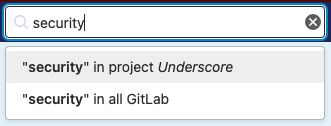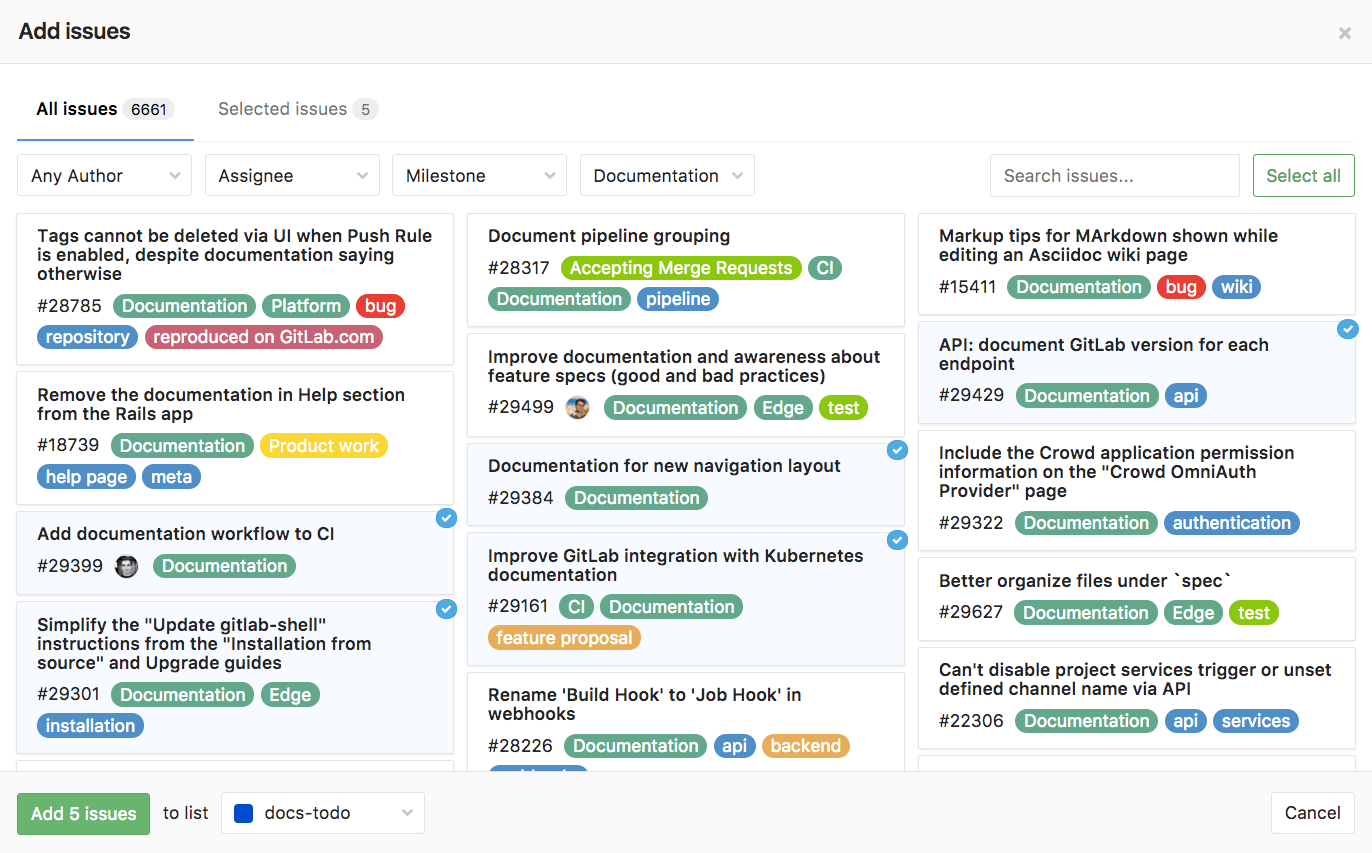15 KiB
| stage | group | info |
|---|---|---|
| Data Stores | Global Search | To determine the technical writer assigned to the Stage/Group associated with this page, see https://about.gitlab.com/handbook/engineering/ux/technical-writing/#assignments |
Searching in GitLab (FREE)
GitLab has two types of searches available: basic and advanced.
Both types of search are the same, except when you are searching through code.
- When you use basic search to search code, your search includes one project at a time.
- When you use advanced search to search code, your search includes all projects at once.
Basic search
Use basic search to find:
- Projects
- Issues
- Merge requests
- Milestones
- Users
- Epics (when searching in a group only)
- Code
- Comments
- Commits
- Wiki
Perform a search
To start a search, type your search query in the search bar on the top-right of the screen.
After the results are displayed, you can modify the search, select a different type of data to search, or choose a specific group or project.
Code search
To search through code or other documents in a single project, you can use the search field on the top-right of your screen while the project page is open. Code search shows only the first result in the file.
Git blame from code search
Introduced in GitLab 14.7.
You can access Git blame from any line that returned a result from the code search:
SHA search
You can quickly access a commit from the project dashboard by entering the SHA into the search field on the top right of the screen. If a single result is found, you are redirected to the commit result and given the option to return to the search results page.
Search issues and merge requests
To search through issues and merge requests in multiple projects, on the top bar, select the Issues or Merge requests links.
The numbers indicate how many issues, merge requests, and to-do items are assigned to you:
- {issues} Issues: Issues assigned to you.
- {merge-request-open} Merge requests: Open merge requests.
Select the icon to show a dropdown list of merge request filters:
- Attention requests ({attention-solid}) for you.
- Review requests for you.
- Merge requests assigned to you.
- {todo-done} To-do items: The to-do items assigned to you.
You can search through Open, Closed, or All issues.
You can also filter the results using the search and filter field, as described in Filter issue and merge request lists.
Issues and MRs assigned to you or created by you
GitLab shows shortcuts to issues and merge requests created by you or assigned to you in the search field in the upper right corner:
Filter issue and merge request lists
- Filtering by epics was introduced in GitLab 12.9.
- Filtering by child epics was introduced in GitLab 13.0.
- Filtering by iterations was introduced in GitLab 13.6.
- Filtering by iterations was moved from GitLab Ultimate to GitLab Premium in 13.9.
- Filtering by type was introduced in GitLab 13.10 with a flag named
vue_issues_list. Disabled by default.- Filtering by type was enabled on self-managed in GitLab 14.10.
- Filtering by type is generally available in GitLab 15.1. Feature flag
vue_issues_listremoved.- Filtering by attention request was introduced in GitLab 14.10 with a flag named
mr_attention_requests. Disabled by default.
Follow these steps to filter the Issues and Merge requests list pages in projects and groups:
- Select Search or filter results....
- In the dropdown list that appears, select the attribute you wish to filter by:
- Assignee
- Attention requests
- Author
- Confidential
- Epic and child Epic (available only for the group the Epic was created, not for higher group levels).
- Iteration
- Label
- Milestone
- My-reaction
- Release
- Type
- Weight
- Search for this text
- Select or type the operator to use for filtering the attribute. The following operators are
available:
=: Is!=: Is not (Introduced in GitLab 12.7)
- Enter the text to filter the attribute by. You can filter some attributes by None or Any.
- Repeat this process to filter by multiple attributes. Multiple attributes are joined by a logical
AND.
GitLab displays the results on-screen, but you can also retrieve them as an RSS feed.
Searching for specific terms
You can filter issues and merge requests by specific terms included in titles or descriptions.
- Syntax
- Searches look for all the words in a query, in any order. For example: searching
issues for
display bugreturns all issues matching both those words, in any order. - To find the exact term, use double quotes:
"display bug"
- Searches look for all the words in a query, in any order. For example: searching
issues for
- Limitation
- For performance reasons, terms shorter than 3 chars are ignored. For example: searching
issues for
included in titlesis same asincluded titles - Search is limited to 4096 characters and 64 terms per query.
- For performance reasons, terms shorter than 3 chars are ignored. For example: searching
issues for
Retrieve search results as feed
Feeds for merge requests were introduced in GitLab 14.3.
GitLab provides RSS feeds of search results for your project. To subscribe to the RSS feed of search results:
- Go to your project's page.
- On the left sidebar, select Issues or Merge requests.
- Build your search query as described in Filter issue and merge request lists.
- Select the feed symbol {rss} to display the results as an RSS feed in Atom format.
The URL of the result contains both a feed token, and your search query. You can add this URL to your feed reader.
Filtering by ID
Introduced in GitLab 12.1.
You can filter the Issues list to individual instances by their ID. For example, enter filter #10 to return only issue 10. The same applies to the Merge requests list. Enter filter #30 to return only merge request 30.
Filtering merge requests by approvers (PREMIUM)
Moved to GitLab Premium in 13.9.
To filter merge requests by an individual eligible approver (Code owner), you can type (or select from the dropdown list) Approver and select the user.
Filtering merge requests by "approved by" (PREMIUM)
- Introduced in GitLab 13.0.
- Moved to GitLab Premium in 13.9.
To filter merge requests already approved by a specific individual, you can type (or select from the dropdown list) Approved-By and select the user.
Filtering merge requests by reviewer
Introduced in GitLab 13.7.
To filter review requested merge requests for a specific individual, you can type (or select from the dropdown list) Reviewer and select the user.
Filtering merge requests by environment or deployment date
Introduced in GitLab 13.6.
To filter merge requests by deployment data, such as the environment or a date, you can type (or select from the dropdown list) the following:
- Environment
- Deployed-before
- Deployed-after
NOTE: Projects using a fast-forward merge method do not return results, as this method does not create a merge commit.
When filtering by an environment, a dropdown list presents all environments that you can choose from:
When filtering by Deployed-before or Deployed-after, the date refers to when
the deployment to an environment (triggered by the merge commit) completed successfully.
You must enter the deploy date manually. Deploy dates
use the format YYYY-MM-DD, and must be quoted if you wish to specify
both a date and time ("YYYY-MM-DD HH:MM"):
Filters autocomplete
GitLab provides many filters across many pages (issues, merge requests, epics, and pipelines among others) which you can use to narrow down your search. When using the filter functionality, you can start typing characters to bring up relevant users or other attributes.
For performance optimization, there is a requirement of a minimum of three
characters to begin your search. To search for issues with the assignee Simone Presley,
you must type at least Sim before autocomplete displays results.
Search history
Search history is available for issues and merge requests, and is stored locally in your browser. To run a search from history:
- In the top menu, select Issues or Merge requests.
- To the left of the search bar, select Recent searches, and select a search from the list.
Removing search filters
Individual filters can be removed by clicking on the filter's (x) button or backspacing. The entire search filter can be cleared by clicking on the search box's (x) button or via ⌘ (Mac) + ⌫.
To delete filter tokens one at a time, the ⌥ (Mac) / Control + ⌫ keyboard combination can be used.
Filtering with multiple filters of the same type
Some filters can be added multiple times. These include but are not limited to assignees and labels. When you filter with these multiple filters of the same type, the AND logic is applied. For example, if you were filtering assignee:@sam assignee:@sarah, your results include only entries whereby the assignees are assigned to both Sam and Sarah are returned.
To-Do List
You can search your To-Do List by "to do" and "done". You can filter to-do items per project, author, type, and action. Also, you can sort them by Label priority, Last created, and Oldest created.
Projects
You can search through your projects from the top bar, by selecting Menu > Projects. On the field Filter by name, type the project or group name you want to find, and GitLab filters them for you as you type.
You can also look for the projects you starred (Starred projects). You can Explore all public and internal projects available in GitLab.com, from which you can filter by visibility, through Trending, best rated with Most stars, or All of them.
You can also sort them by:
- Name
- Created date
- Updated date
- Owner
You can also choose to hide or show archived projects.
Groups
Similarly to projects search, you can search through your groups from the left menu, by clicking the menu bar, then Groups.
On the field Filter by name, type the group name you want to find, and GitLab filters them for you as you type.
You can also Explore all public and internal groups available in GitLab.com, and sort them by Name, Last created, Oldest created, or Updated date.
Issue boards
From an issue board, you can filter issues by Author, Assignee, Milestone, and Labels. You can also filter them by name (issue title), from the field Filter by name, which is loaded as you type.
To search for issues to add to lists present in your issue board, select the button Add issues on the top-right of your screen, opening a modal window from which you can, besides filtering them by Name, Author, Assignee, Milestone, and Labels, select multiple issues to add to a list of your choice:
Autocomplete suggestions
In the search bar, you can view autocomplete suggestions for:
- Projects and groups
- Various help pages (try and type API help)
- Project feature pages (try and type milestones)
- Various settings pages (try and type user settings)
- Recently viewed issues (try and type some word from the title of a recently viewed issue)
- Recently viewed merge requests (try and type some word from the title of a recently viewed merge request)
- Recently viewed epics (try and type some word from the title of a recently viewed epic)
- GitLab Flavored Markdown (GLFM) for issues in a project (try and type a GLFM reference for an issue)
Search settings
- Introduced in GitLab 13.8 with a flag named
search_settings_in_page. Disabled by default.- Added to Group, Administrator, and User settings in GitLab 13.9.
- Feature flag
search_settings_in_pageremoved in GitLab 13.11.- Generally available in GitLab 13.11.
You can search inside a Project, Group, Administrator, or User's settings by entering a search term in the search box located at the top of the page. The search results appear highlighted in the sections that match the search term.













